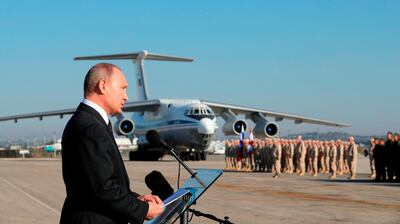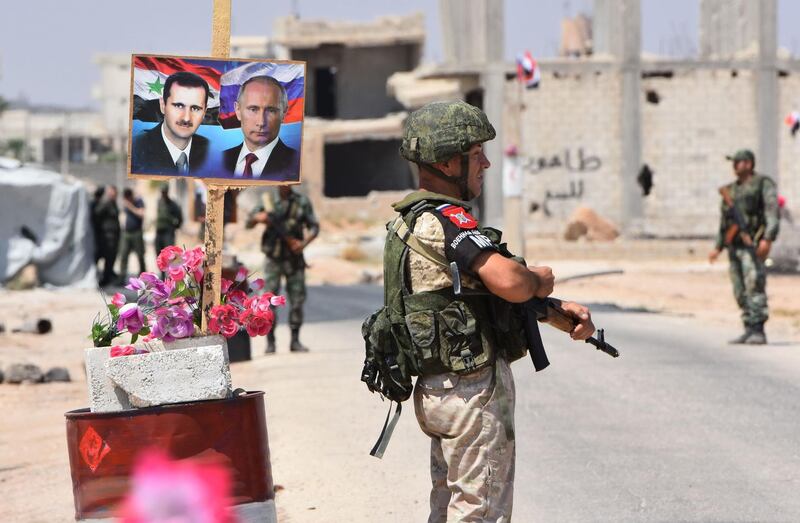The US has warned Russia and President Bashar Al Assad's regime that it will respond to any chemical weapons attacks in the northern Syria province of Idlib, as humanitarian officials sound the alarm over an impending offensive against the last rebel stronghold.
US Defence Secretary James Mattis said he had been in "active communication" with Moscow to deter the use of chemical weapons by Mr Assad's forces.
Those comments followed evidence that an assault is looming, with a major build up of Russian naval forces in the Mediterranean and counter accusations from Moscow that Western countries and anti-Assad rebels were planning to stage chemical attacks.
"You have seen our administration act twice on the use of chemical weapons," Mr Mattis said late on Tuesday, referring to previous occasions when the US launched strikes against the Syrian government.
State Department spokeswoman Heather Nauert added that the US would respond to any verified chemical weapons use in Idlib or elsewhere in Syria "in a swift and appropriate manner".
After recapturing much of the country from rebels over the past year, the Syrian government has turned its attention to the northwest.
Idlib, a northwestern province that borders Turkey, has served as a refuge for those fleeing the civil war but it has also harboured militants accused of alignment with Al Qaeda. Russia has announced talks with several armed groups there in the hope of striking a deal similar to settlements reached in Eastern Ghouta and the southern province of Deraa.
But militant leaders have called on fighters not to hand over their weapons and to keep up the fight against the regime. Russian and regime manoeuvres, as well as potential rebel defiance, could all equate to a protracted and deadly offensive.
______________
Read more:
Russia readies for Idlib campaign with fake news and major naval build-up
Opinion: How Putin is engineering a politically palatable way out of Syria
______________
In recent weeks, Damascus has sent reinforcements to surround Idlib, most of which is controlled by Hayat Tahrir al-Sham (HTS), a former Al Qaeda affiliate. The rest of the province is held by a coalition of rebel groups backed by Turkey, which has sought to delay a government offensive by attempting to rein in extremists in the province, and by seeking a diplomatic solution with Russia.
But so far no agreement has been forthcoming, leading to fears for the roughly 2.5 million civilians who live in Idlib – around half of whom were displaced from other parts of the country.
John Ging, a senior official with the UN Humanitarian Affairs office, said increased government bombing in the province over the past few weeks has already placed a strain on humanitarian efforts, but that much worse could be yet to come.

"A worst-case scenario in Idlib will overwhelm capacities and has the potential to create a humanitarian emergency at a scale not yet seen through this crisis," he said.
"Humanitarian organisations are doing what they can with the resources available to them to sustain the current response and prepare for a possible further deterioration."
The UN warned on Wednesday that 800,000 people are at risk of displacement in Idlib and the surrounding areas if the Syrian government launches an attack.
Linda Tom, a representative of the United Nations Humanitarian Coordination Office (OCHA), said that the number of people in need of humanitarian assistance "could increase dramatically".
But humanitarian pleas over Idlib's fate have been overshadowed by the back-and-forth between Russian and Western officials in recent days.
Western states suspect the Syrian government might use chemical weapons in its Idlib campaign, as it has done several times in the past. And Russia, Mr Assad's main military ally, has sought to muddy the waters ahead of the offensive, claiming that Western powers and Syrian rebels were planning to stage a chemical attack to justify an attack on the Syrian government.
Russian defence ministry spokesman Igor Konashenkov said at the weekend that Hayat Tahrir al-Sham is "preparing another provocation of the 'use of chemical weapons' by Syrian government forces against the peaceful population of the Idlib province".
In a statement, he added that militants had been "trained in handling poisonous substances under the supervision of specialists from the private British military company 'Oliva [sic].'”
"The militants have the task of simulating the rescue of the victims of the chemical weapons attack dressed in the clothes of the famous 'White Helmets'," it said.
James Le Mesurier, the founder of the White Helmets, described the allegations as "preposterous", and said it was an attempt by Russia to "distort the information environment for the use of chemical weapons by the Assad Regime in Idlib".
Russia has continued to talk behind the scenes with the major powers involved in Syria's civil war to find a way out of a full-scale assault. Deputy Foreign Minister Mikhail Bogdanov was cited by a Russian news agency on Wednesday as saying that Moscow was discussing the fate of Idlib with Turkey and Iran.
Speaking on Wednesday, Russian foreign minister Sergei Lavrov said that Russia and Turkey had reached an understanding on distinguishing between the Syrian opposition and terrorists, which he called a “festering abscess” that needed to be removed.
"I hope our Western partners will not give in to (rebel) provocations and will not obstruct an anti-terror operation" in Idlib, he added.
The relationship between Russia and Turkey is seen as being the key to avoiding a humanitarian catastrophe in Idlib, according to analysts.
"Russia doesn't like the rebels and they want to help Assad lock down his victory, but they also have strong incentives to continue courting the Turks," Aron Lund, a fellow at the Century Foundation think tank, told The National.
"Turkey is in trouble economically and has made limited headway so far in its attempts to de-jihadise the rebellion. But they also don't want to deal with a refugee crisis, and Russia may at this stage be looking beyond Syria to influence Turkey's broader foreign policy posture."
The biggest obstacle to a negotiated solution is the fate of Hayat Tahrir al-Sham. The group, which controls 60 percent of Idlib, has so far refused to consider a settlement with the Syrian government. Its leader, Abu Mohamed Al Jolani, said last week that "just thinking about surrendering to the enemy and handing over weapons is treason."





